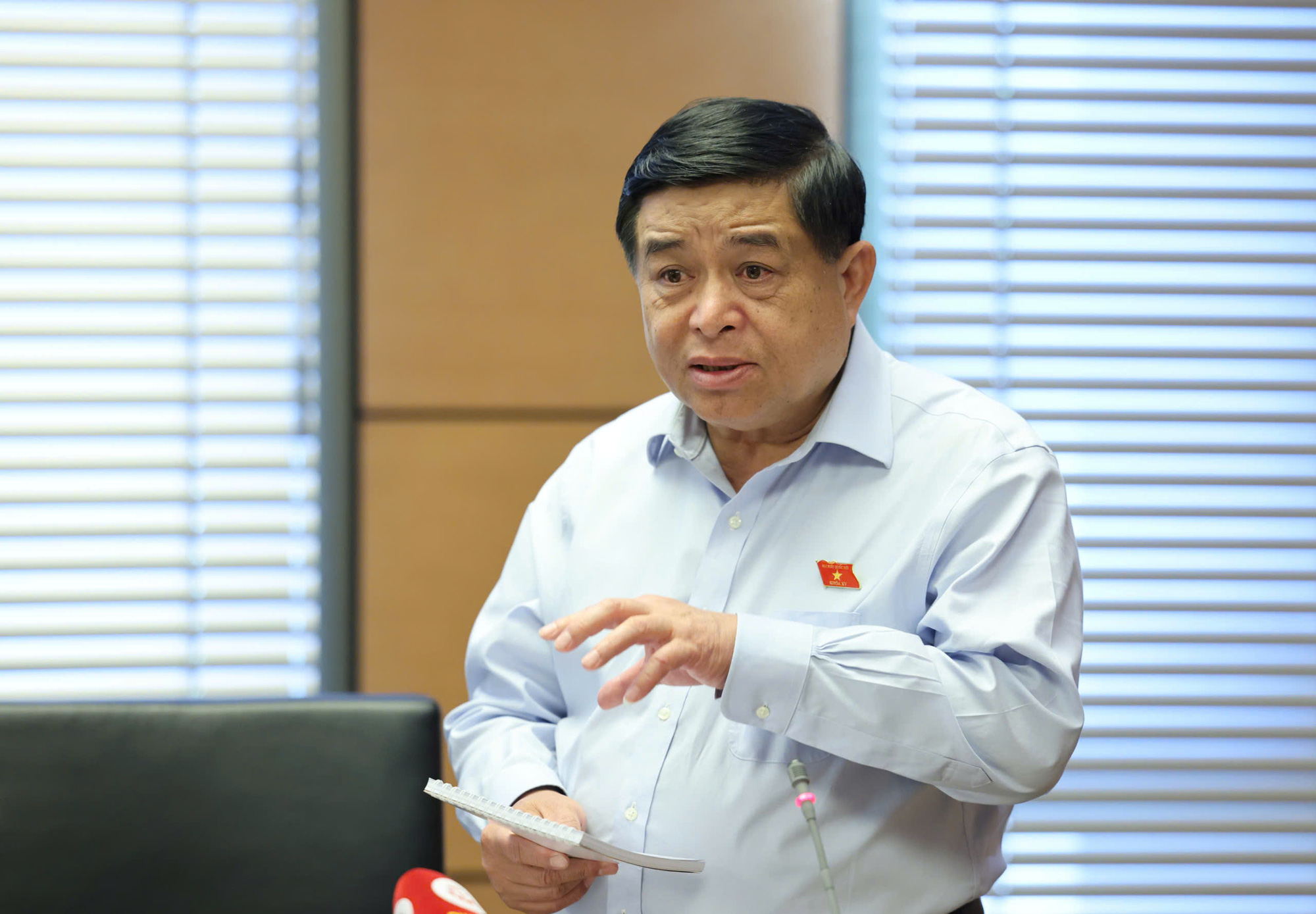Minister Nguyen Chi Dung affirmed that the policy proposals put forward in the draft Law on Public Investment (amended) have all gone through a "whole process" of review, summarization, and selection of truly urgent issues.

Minister Nguyen Chi Dung - Photo: GIA HAN
On the afternoon of October 29th, the National Assembly held group discussions on the revised Public Investment Law. During the discussions, the majority of opinions expressed agreement with the strong decentralization and delegation of power to local authorities.
Simultaneously manage, open up, create, and promote development.
Speaking at the group discussion, Minister of Planning and Investment Nguyen Chi Dung affirmed that the policy proposals put forward in this revised Public Investment Law have all gone through a process of review, summarization, and selection of truly urgent issues.
Most importantly, it is in line with the spirit of removing obstacles to promote development, and promptly institutionalizing the regulations, policies, and decisions of the Party and the National Assembly.
In particular, the shift in mindset is from a management-oriented approach to a new one that combines management with openness, innovation, and fostering development.
He cited the example of laws that were originally well-designed for a particular period and were very effective, but are now failing to keep up with the new demands of development, rather than the laws being flawed.
"But now many aspects are no longer suitable, so they need to be revised to keep up with requirements. How can we manage effectively while also opening up opportunities for development, and at the same time maintain control to avoid risks and shortcomings in the future?" Mr. Dung said.
According to Minister Nguyen Chi Dung, if the amended law is passed by the National Assembly at this session, it will be very timely in preparing for the medium-term public investment plan for the next period (2026 - 2030). Any delay would cause many negative consequences.
He emphasized that quality should not be compromised for the sake of time, but with this draft law, the Government has selected issues that are very mature, very clear, and very urgent. If passed by the National Assembly at its 8th session, "this bill will be a major breakthrough."
Regarding specific issues, the minister emphasized the policy proposal to separate land clearance into an independent project for all project groups.
According to the minister, the long-standing slow disbursement of public investment funds has many causes, but the most important is land clearance.
According to current regulations, subsequent steps such as land clearance, surveying, assessment, and resettlement can only be carried out after an investment decision has been made, which is very time-consuming.
Separating the land clearance process will shorten the time required for investment preparation. Most importantly, clearly defining the stages and assigning specific responsibilities to each stage will accelerate project implementation.
The National Assembly cannot sit and deal with every single, small project.
Regarding the issue of decentralization and delegation of power, Mr. Dung said that the recent 10th Central Committee Conference had agreed on this, allowing localities to make their own decisions, act independently, and take responsibility for their own actions, meaning that maximum authority is given to the localities.
He said the National Assembly would delegate authority to the Standing Committee of the National Assembly, the Standing Committee of the National Assembly would delegate authority to the Government, and the Government would delegate authority to the localities. At the local level, the People's Council would delegate authority to the People's Committee for flexibility in administration.
Mr. Dung further analyzed that the Constitution stipulates that the National Assembly decides on budgetary matters, but it does not specify how these decisions are made. The regulations have long been based on self-interpretation, interpretation, and decision-making.
This time, the Government proposed that the National Assembly decide on the total budget, while any adjustments or unforeseen expenses would be left to the Prime Minister for the "fastest" decision.
Furthermore, if projects need to be submitted to the National Assembly, there's a waiting period to complete the procedures for submission all at once. It's not feasible for each province to have several projects and submit them to the National Assembly simultaneously.
"The National Assembly cannot sit and deal with every single small project. But if we don't do anything, the localities will wait and miss opportunities," Mr. Dung said, adding that the government's proposal aims for maximum flexibility, while still allowing the National Assembly to control the overall national budget.
The proposal for the People's Council to delegate the authority to the People's Committee to decide on investment policies for Group B and C projects is a matter of concern for the Finance and Budget Committee.
Mr. Dung stated that in reality, 43 provinces have already been decentralized, and the only change here is the level of authority for investment policy decisions; everything else remains unchanged. Furthermore, the government consulted all 63 provinces and cities, and 100% agreed.
The minister emphasized the need to ensure effective management while simplifying and facilitating processes, and simultaneously maintaining effective supervision and inspection.
"It's still in accordance with regulations, it's not like we're letting the chickens out to chase them. We let them out, but we have to control them, mitigate risks, and limit their spread," Mr. Dung further emphasized.
Source: https://tuoitre.vn/bo-truong-nguyen-chi-dung-don-gian-hoa-thuan-loi-nhung-dung-quy-dinh-chu-khong-tha-ga-ra-duoi-20241029201908012.htm




![[Photo] Prime Minister Pham Minh Chinh attends the Conference on the Implementation of Tasks for 2026 of the Industry and Trade Sector](/_next/image?url=https%3A%2F%2Fvphoto.vietnam.vn%2Fthumb%2F1200x675%2Fvietnam%2Fresource%2FIMAGE%2F2025%2F12%2F19%2F1766159500458_ndo_br_shared31-jpg.webp&w=3840&q=75)









































































































Comment (0)